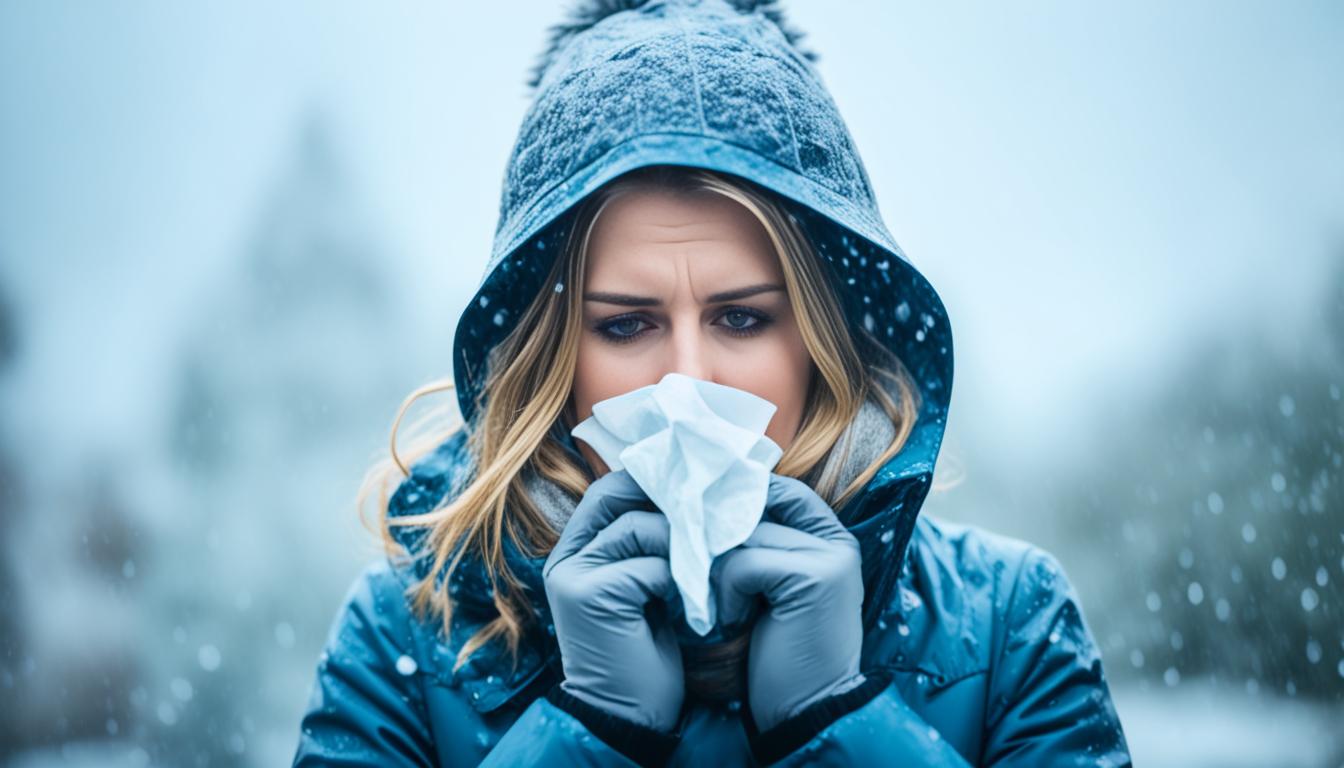The common cold is a viral infection. It affects the upper respiratory tract. You can get it from viruses like coronaviruses and rhinoviruses.
It causes a sore throat, runny nose, and muscle aches. The sickness spreads easily through the air and on surfaces. So, it’s very contagious.
Key Takeaways:
- The common cold is a viral infection that affects the upper respiratory tract.
- Caused by various viruses, including coronaviruses and rhinoviruses.
- Symptoms include a sore throat, runny nose, and muscle aches.
- Colds are highly contagious and can spread through droplets in the air and on surfaces.
- Home remedies and over-the-counter medications are commonly used for treatment.
- Stem cell therapy advancements in Thailand offer potential for more effective diagnosis and treatment of the common cold.
Common Cold Symptoms and Complications
The common cold is a viral infection known for its symptoms. These can be different for everyone. But, most people with a cold have a runny nose, cough, and will sneeze a lot. You may also feel your throat is sore and find it hard to breathe through your nose. Luckily, these symptoms are usually not too severe and go away in a few days.
Sometimes, rare but serious symptoms might show up. You could get a high fever, find it hard to breathe, or feel confused. Watch out for these, as they might mean something more serious. Those with a weakened immune system need to be careful, as they can get sicker.
Pneumonia is a major concern for cold sufferers. It’s when the cold virus infects the lungs. This can be dangerous, especially for those with weak immune systems. Pneumonia causes a high fever and a bad cough, among other symptoms. If you feel very sick, don’t wait to get help.
If you have asthma or COPD, colds can make breathing much harder. The cold virus irritates the airways, leading to worse asthma or COPD symptoms. It’s really important for those with these conditions to be careful and to see a doctor if they start feeling worse.
| Complications | Description |
|---|---|
| Pneumonia | A lung infection that can occur when the cold virus spreads to the lungs. It can cause symptoms such as fever, cough with phlegm, chest pain, and difficulty breathing. |
| Asthma Exacerbation | The cold virus can exacerbate breathing difficulties in individuals with asthma, leading to increased wheezing, coughing, and shortness of breath. |
| COPD Exacerbation | For individuals with COPD, the common cold can worsen symptoms such as cough, shortness of breath, and increased mucus production. |
Keep an eye on your health during a cold. If things get bad, don’t hesitate to see a doctor. But, there’s a lot you can do to stay healthy. Eat well, drink plenty of water, and get lots of rest. If you have asthma or COPD, make sure you’re following your doctor’s advice closely. They can help you stay as healthy as possible, even when you catch a cold.
Prevention and Treatment of the Common Cold
To keep the common cold away, focus on prevention. This means staying away from infected people and washing your hands often. Try not to touch your face too much. Also, eat lots of fruits and vegetables to help your immune system fight off colds.
There is no cure for the common cold. But, you can ease the symptoms. Here are some things that may help:
- Plenty of fluids: Drink water, clear broths, and herbal teas. This can help with congestion and keep you from getting dehydrated.
- Plenty of rest: Rest is key. It lets your body focus on beating the virus and helps you get better faster.
- Over-the-counter medications: Medicines that you can buy without a prescription, like pain relievers and decongestants, might ease your discomfort.
- Inhaling steam: Breathing in steam can loosen mucus and clear up a stuffy nose. You can use a humidifier or take a hot shower to get steamy.
- Gargling saltwater: Gargling with salt water can help a sore throat feel better. Mix a half teaspoon of salt in warm water, gargle, and then spit it out after 30 seconds.
Some people try natural remedies, like drinking warm lemon and honey. However, the proof that these work is not strong.
Following these tips can lower your risk of getting the common cold. If you do catch a cold, remember these treatment options. If you feel very sick or your cold lasts a long time, see a doctor.
Conclusion
The common cold infects the upper respiratory tract and spreads easily. It hits both kids and adults. Signs include a runny nose, a sore throat, and coughing.
Good hygiene and staying away from sick people can help you avoid it. Living healthy also strengthens your immune system. This makes it easier for your body to fight off viruses. While there’s no direct cure, you can find relief with home treatments and medicine.
Stem cell therapy in Thailand might lead to better ways to diagnose and treat colds. By being careful and getting help when you need it, getting through cold season can be less of a hassle.

